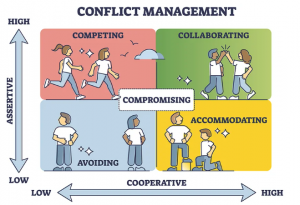
- Accommodating
An accommodating style forsakes your own needs or desires in exchange for those of others. You would be putting the concerns of others before your own. This style usually takes place when you simply give in or are persuaded to give in.
Click here to Read more interesting case study based article on each TLS sub topic in my second website
This style could be appropriate when others care more about the issue than you do, you want to keep the peace, you feel as though you are in the wrong, or you have no choice but to agree with the other person’s point-of-view.
- Avoiding
An avoiding style completely evades the conflict. You would neither pursue your beliefs nor those of the other people involved. Simply, you would continuously postpone or completely dodge the conflict whenever it comes up.
This style could be appropriate to use when the conflict seems trivial, you don’t have the time, you need more time to think, you feel as though you have no chance of winning, or you’re afraid of being met with resentment.
- Compromising
A compromising style attempts to find a solution that will at least partially please all parties. You would work to find a middle ground between all the needs, which would typically leave people unsatisfied or only satisfied to a certain extent.
This style could be appropriate when it’s more important to reach a solution than for the solution to be great, a deadline is rapidly approaching, you’re at an impasse, or you need a temporary solution for the moment.
- Collaborating
A collaborating style attempts to find a solution that will meet the needs of all parties. Rather than trying to find a middle ground solution, you would aim for a solution that satisfies everyone and ends up being a win-win situation.
This style could be appropriate when multiple perspectives need to be addressed, there is an important relationship between the parties, the final solution is too important for anyone to be displeased, or the beliefs of multiple stakeholders must be represented.
- Competing
A competing style takes a firm stance and refuses to see the perspectives of the other parties. You would keep pushing your viewpoint or rejecting other people’s ideas until you get your way.
This style could be appropriate when you have to stand up for your rights or morals, need to make a quick decision and force others to get on board, need to end a long-term conflict, or have to prevent a terrible, opposing decision from being made.